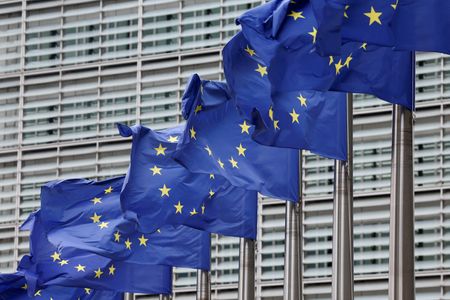BRUSSELS (Reuters) -EU leaders agreed on Thursday to meet Ukraine's pressing financial needs for the next two years but stopped short of explicitly endorsing the use of Russian frozen assets to give Kyiv a large loan, after concerns were raised by Belgium.
"The European Council commits to address Ukraine's pressing financial needs for 2026-2027, including for its military and defence efforts," said a text agreed upon at a summit in Brussels by all leaders of EU countries except Hungary.
The text, seen by Reuters ahead of its official publication, asked the European Commission to present as soon as possible "options for financial support based on an assessment of Ukraine's financing needs".
The text also said that, subject to EU law, "Russia's assets should remain immobilised until Russia ceases its war of aggression against Ukraine and compensates it for the damage caused by its war".
But it did not explicitly endorse using the assets to fund a "reparation loan" worth some 140 billion euros ($163 billion), as the Commission has proposed with the backing of many EU member countries.
The latest draft removed a sentence from an earlier version of the conclusions, which said: "The European Council therefore calls on the Commission to present as soon as possible, based on an assessment of Ukraine’s financing needs, concrete proposals involving the possible gradual use of the cash balances associated with the immobilised Russian assets, in accordance with EU and international law."
Many EU diplomats had expected the leaders to ask the Commission to come forward with a formal legal proposal on the reparation loan plan based on the Russian assets.
But Belgian Prime Minister Bart De Wever, whose country holds the frozen assets that would be used in the scheme via securities depository Euroclear, laid out three demands to guarantee that his country would not shoulder all the risks.
"If demands are met, we can go forward. If not, I will do everything in my power at the European level, also at the national level, politically and legally to stop this decision," De Wever said on arrival at the summit.
He called on all EU members to share the costs of any legal action pursued by Russia and contribute financially if the money ever had to be paid back. He also said Russian frozen assets held by other countries should be part of the scheme.
"There must be transparency about the risk. There must be transparency about the legal basis for this decision," he said.
($1 = 0.8575 euros)
(Reporting by Jan Strupczewski; Writing by Charlotte Van Campenhout; Editing by Andrew Gray and Edmund Klamann)







